Trending

Significant policy gaps exist when it comes to secondary and tertiary education an IPS survey revealed recently. It also said that Sri Lanka has been performing well at the primary education level. IPS research indicates that only 35% of the age 15 and above population has completed upper-secondary education in Sri Lanka, and only 13.3% had completed tertiary education. Meanwhile, the Labour Demand Survey (LDS) conducted by the Department of Census and Statistics has found that nearly one third of first-time job seekers coming from university or other higher education institutions are poorly prepared, primarily due to lack of job-specific skills or competencies as well as soft skills. Speaking at the IPS hosted Policy Engagement Forum on ‘Education and Skills for Prosperity Forum, IPS Executive Director, Dushni Weerakoon, highlighted that education reforms are a priority for Sri Lanka as labour productivity is the key to ensuring the country’s growth.Especially, foreign investors will be looking at the kind of skill sets Sri Lanka can offer when making investment decisions, she further said, noting the importance of embedding highly-demanded skills in the graduates. The policy recommendations made during the Forum discussion included improving the quality of teachers, providing more teacher-training programmes, and making career guidance available at the school level. The current school curricula and the examination-based testing methods were identified as major weaknesses of the education system. Better planning is essential with regard to the professional development and education of teachers, it was further noted. The Policy Engagement Forum aimed to identify knowledge gaps in better understanding the constraints for improving the relevance and quality of education in Sri Lanka.




